Importance of worshipping God (Vishnu / Krishna / Rama) and following Dharma (Hinduism) (Importance, significance, facts) | Worshipping God as per Hindu scriptures
Namaste friends, how are you doing today? Welcome to #BhagavanBhakthi website / blog.
Bhagavan Lord Sri Vishnu (Krishna) (Rama) (Hari) (Narayana) (Trivikrama) (Narasimha) (Vedavyasa) and Goddess Lakshmi (Rukmini) (Sita) (Dharini) blessings to you and your family!
In this website / blog, you will always learn about #Hinduism #Sanskrit language.
Also subscribe to my YouTube channel from this link #BhagavanBhakthi to view videos about #Hinduism #Sanskrit language.
Just before going to “Importance of worshipping God (Vishnu / Krishna / Rama) and following Dharma (Hinduism) (Importance, significance, facts) | Worshipping God as per Hindu scriptures“, let us have some brief information.
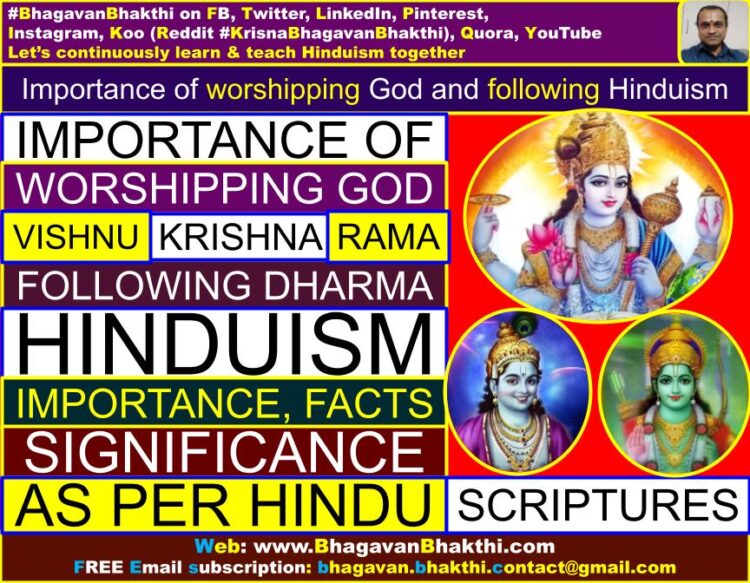
In today’s modern world people (especially the youth) think that worshiping God in Hinduism is religious and they are not interested in being religious. However, Hindu Sanatana Dharma says that there is no correlation between religion and Hindu Sanatana Dharma.
Religion is different Hindu Sanatana Dharma is different. Hindu Sanatan Dharma teaches you what you should and shouldn’t do in your life. For example, when you drive your vehicle, the traffic police have set certain rules and you have to follow those rules.
If you follow those rules, you’ll be safe, and if you’re not, you could be at risk. That is what Hindu Sanatana Dharma says. If you follow the rules and regulations as prescribed in the Hindu scriptures, you can easily lead a happy and fulfilled life, both materially and spiritually.
Not only you will have devotion towards God, but you will also experience the fruits of wealth and prosperity in your life. This is the difference between religion and Hinduism (Sanatana Dharma). In Hinduism, worshipping is an act of devotion and especially directed to Bhagavan Lord Sri Vishnu, other Gods), Rishis, Gurus, Elders etc.
A sense of devotion or Bhakti is generally invoked when worshipping Bhagavan Lord Sri Vishnu, Gods), Rishis, Gurus, Elders etc. Worshipping is not limited to any particular place or time, and it will often incorporate personal devotion with or without slokas (hymns), music, dance and poetry.
In India / Hinduism usually one will worship in Devalayam (Mandir) (Divine temples) or at home to achieve some specific end or to integrate the body, mind and spirit. The main aim of worshipping is to live a pure, happy and satisfied life.
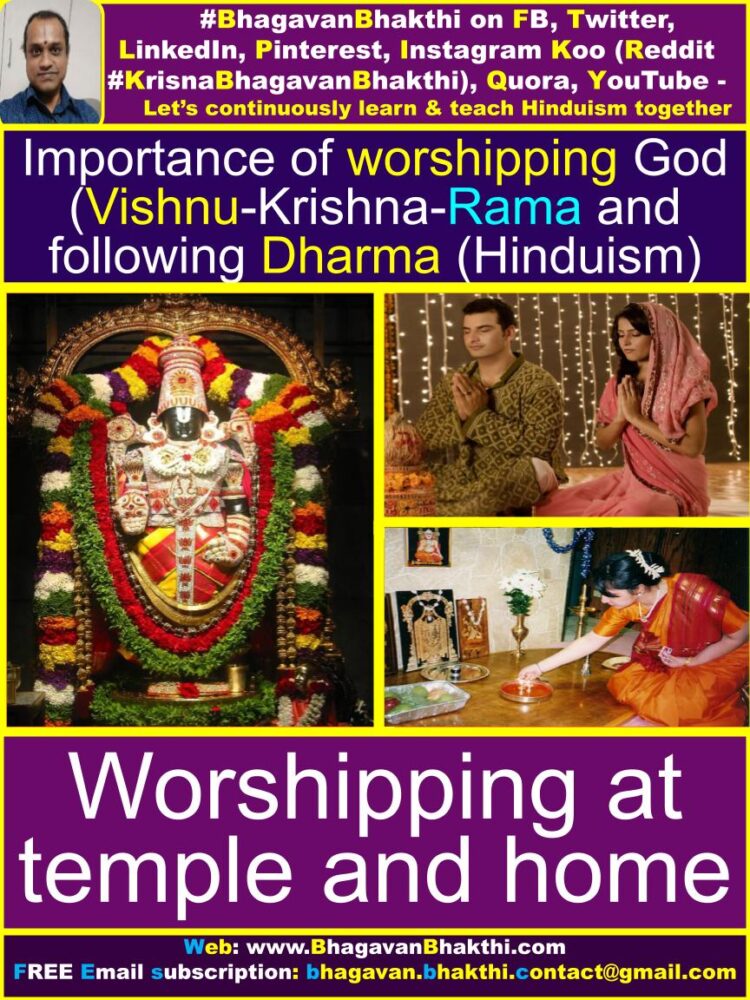
Bhagavan Lord Sri Krishna giving importance on the significance for sincerity, purity of mind and devotion in worship, says in Chapter 9, Sloka #26 of Bhagavad Gita as below:
पत्रं पुष्पं फलं तोयं यो मे भक्त्या प्रयच्छति |
तदहं भक्त्युपहृतमश्नामि प्रयतात्मन: || 26 ||
ಪತ್ರಂ ಪುಷ್ಪಂ ಫಲಂ ತೋಯಂ ಯೋ ಮೇ ಭಕ್ತ್ಯಾ ಪ್ರಯಚ್ಛತಿ |
ತದಹಂ ಭಕ್ತ್ಯುಪಹೃತಮಶ್ನಾಮಿ ಪ್ರಯತಾತ್ಮನಃ || 26 ||
patraṁ puṣpaṁ phalaṁ tōyaṁ yō mē bhaktyā prayacchati |
tadahaṁ bhaktyupahr̥tamaśnāmi prayatātmanaḥ || 26 ||
Meaning of this sloka is as follows: “Whoever offers Me (Bhagavan Lord Sri Krishna) with bhakti / devotion even a leaf, a flower, a fruit, or some water, offered with pure-mind and bhakti / devotion, that I will definitely accept”.
It is not importance of the design, not the elaborateness of the ritual, nor the splendor of gold and wealth exhibited here, nor even the number of devotees attending that contribute to the essential success.
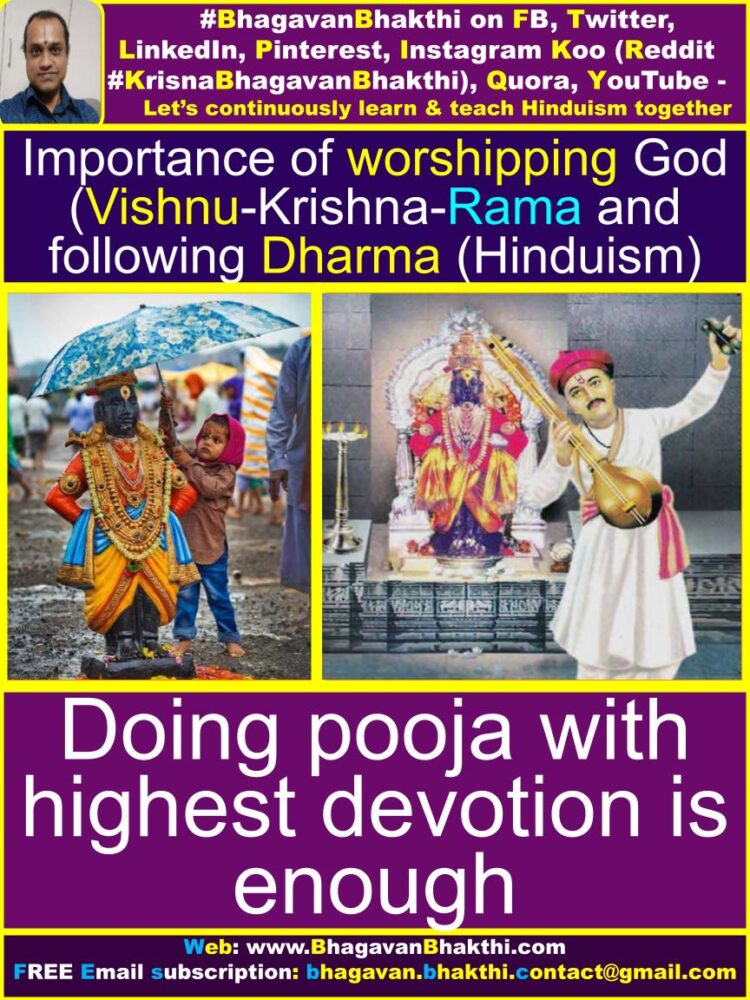
We should always remember that ultimately it is the sincerity and bhakti / devotion that counts in the worship of Bhagavan Lord Sri Krishna (Vishnu) or other Gods), Rishis, Gurus, Elders.
The very language and diction of the above shloka very clearly sound the note, that the material objects that one might offer are of no value to the Bhagavan Lord Sri Krishna and others, but it is the bhakti / devotion and love that prompt the offerings that are accepted by him.
One can offer a smiple “a leaf, a flower, a fruit, or some water”, it is but an insignificant thing that you offer. Be it not a golden temple, it is only a fresh leaf, “whosoever with bhakti / devotion offers” whatever be the offering, Bhagavan Lord Sri Krishna and other Gods assures “that he/they will definitely accept it.”
When someone lovingly gives something, it becomes “a devout gift” and when it is offered by a sincere and pure mind of devotee, Bhagavan Lord Sri Krishna (Vishnu or any of his avatars) will surely accept it.
Similarly other Gods like Lord Shiva who gets pleased with a drop of water on his head (on Shiva Linga) and worship with a leaf (Patra), especially with the leaf known as ‘Bilva Patra’ with sincerity, purity of mind and true devotion.
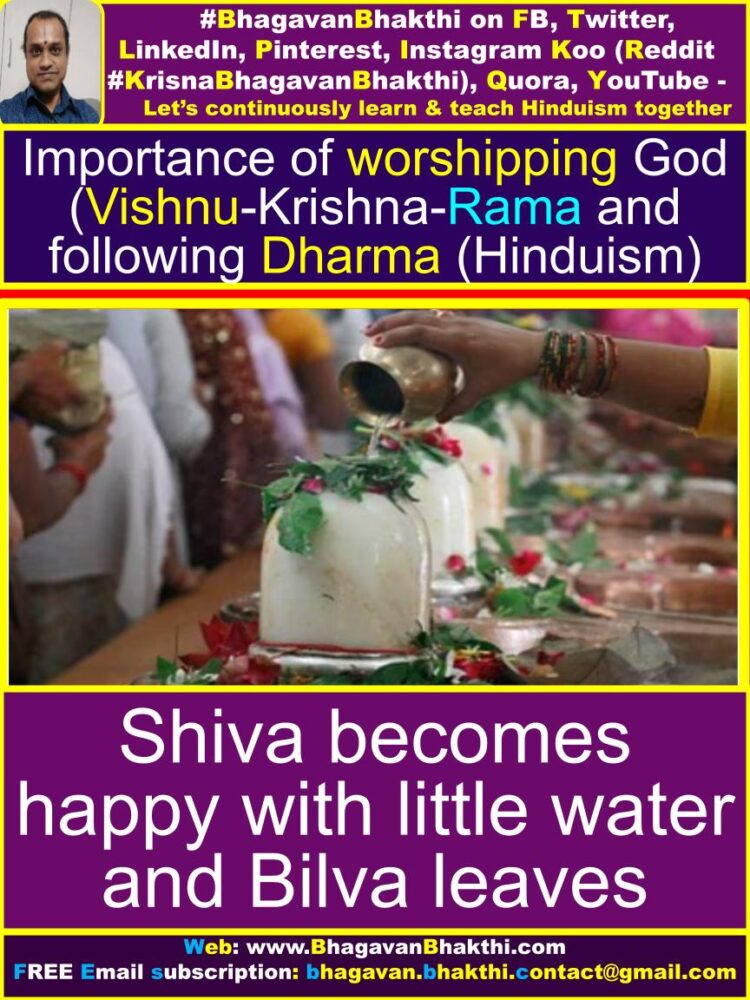
This falls in the category of simplest forms of worship of Lord Shiva who is symbolized in the most modest form.
In the episode of ‘श्री कृष्ण तुलाभरम् (Sri Krishna Tulabharam) (śrī kr̥ṣṇa tulābharaṁ)’ (As per Srimad Bhagavata Purana) we come across Goddess Rukmini Devi the prime queen of Bhagavan Lord Sri Krishna exhibiting her true devotion could win back Bhagavan Lord Sri Krishna offering a ‘Tulasi Dalam’.
The episode conveys a great and divine message that how humble offering to the Bhagavan Lord Sri Krishna is much greater than offering the richest of the material wealth.
To read full story of ‘Sri Krishna Tulaabharam‘ or ‘Sri Krishna Rukmini Satyabhama story”, you can visit this link:
Sri Krishna Rukmini Satyabhama story
Therefore, on the whole, it is clear that an offering can be efficient, only when it is accompanied by the two required conditions:
1. “offered with devotion” and 2. “by the pure-mind”.
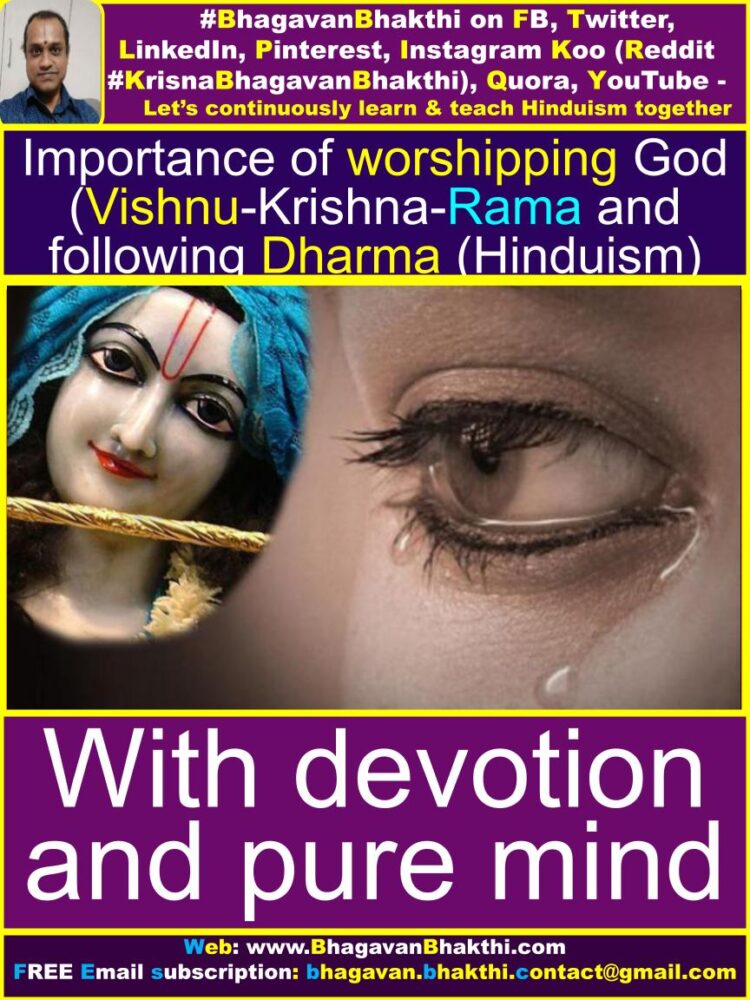
This is the quintessence of worship. To the extent if these features are absent, then all offerings will be mere economic waste and superstition breeding false-beliefs. If properly done with real bhakti / devotion and with pure mind, it can serve as a great vehicle to tread the spiritual path of self development.
To understand about the importance of worship in Hinduism in more depth let us take few examples from Hindu scriptures like Hindu Puranas, Mahabharata, Ramayana as given below:
Sudama (Brahmin) : Sudama was a great devotee of Lord Sri Krishna (Vishnu) and at the same time he lived a simple life, but he lived the life as prescribed in the Hindu scriptures (Shastras). He followed all the rules of how a Brahmin should lead his life as per the scriptures.
By this devotion to Lord Sri Krishna (Vishnu) he got all the wealth of the world. Lord Sri Krishna gave him a house built with gold and wealth and prosperity. This is the glory of showing devotion to Lord Krishna (Vishnu) and at the same time following the rules of Hindu Sanatana Dharma.
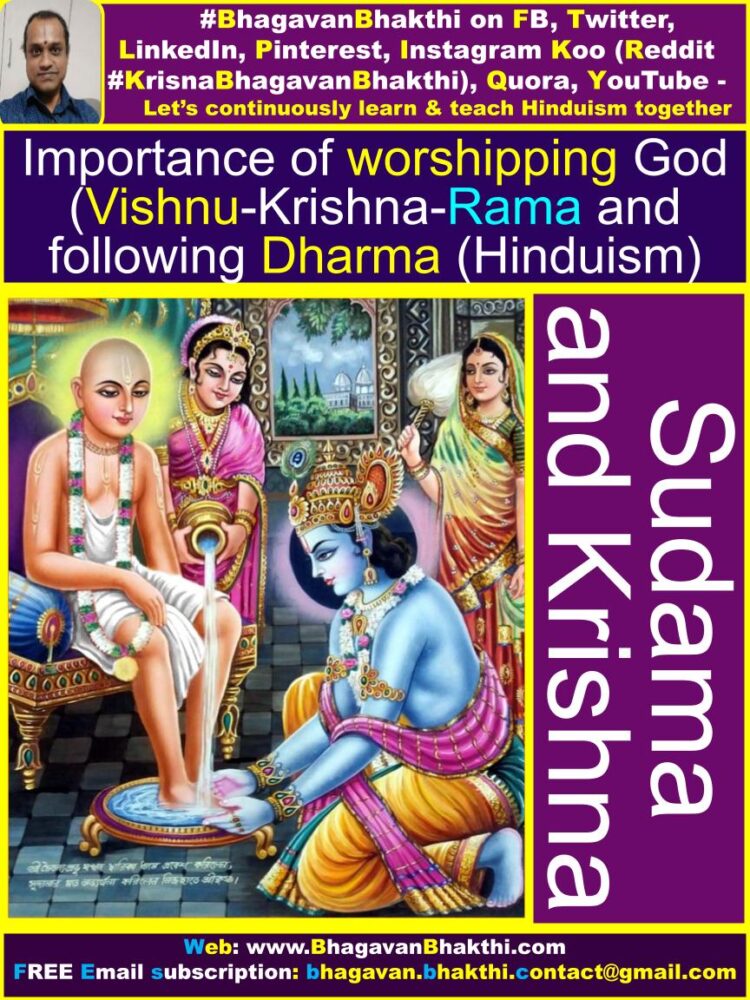
Pandavas : The five Pandavas faced many hardships throughout their lives. But in the end, they became the rulers of the whole world. Yudhishthira became a samrat (emperor), Bhima became a yuvaraja (prince) and Arjuna, Nakula and Sahadeva also assumed great and powerful positions.
All the five Pandavas did nothing special. They were the devotees of Lord Sri Krishna (Vishnu) and followed the rules and regulations of Hindu Sanatan Dharma to the best of his ability. That’s it and nothing else.
Throughout their lives, Pandavas never deviated from Dharma and thus they were able to lead a successful life later on.
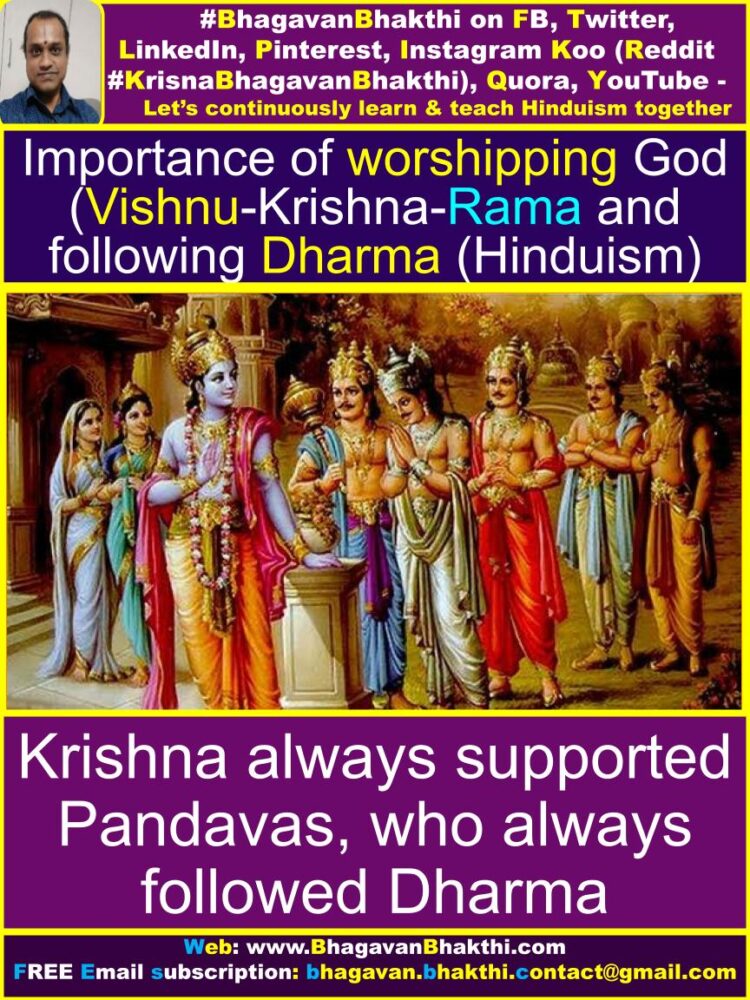
Duryodhana : Duryodhana was the exact opposite of the five Pandavas. Although he was born in the noble lineage of the Kuru dynasty, he never followed the rules and regulations of Hindu Sanatana Dharma. He wanted to enjoy life and never paid respect to his parents Dhritarashtra and Gandhari and other elders like Bhishma, Drona, Kripacharya, Vidura etc.
Duryodhana was never a devotee of Lord Sri Krishna (Vishnu) and thus met his own end. He was easily killed by Bhima at the end of Mahabharata or Kurukshetra war.
Even when Duryodhana was lying on the ground, he had a grudge against the five Pandavas and Lord Krishna. His whole body was eaten by animals. This is the difference between being Dharmic and Adharmic people.
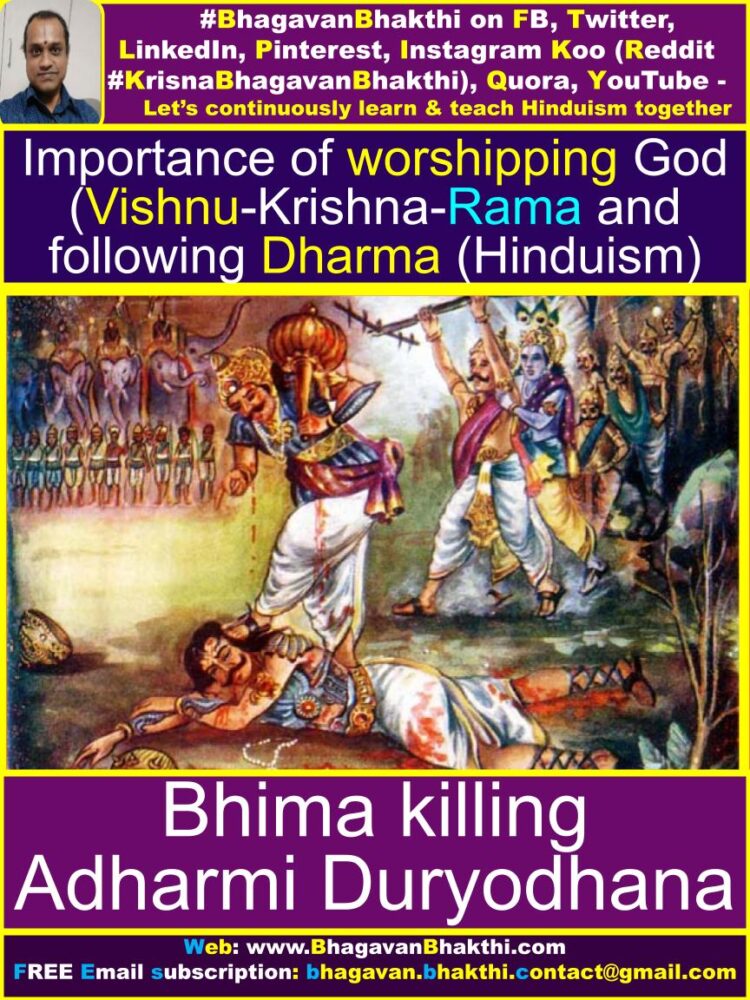
Ravana : Ravana always hated both Lord Sri Rama and Sanatana Dharma. In TV serials and movies he is shown as a Vedic scholar. Ramayana on the other hand says that he was not at all interested in following any rules and regulations of Sanatana Dharma.
Ravana just wanted to enjoy his life with many women. Ravana rapes an apsara named Rambha. Whenever he attacked other kingdoms, he abducted thousands of young women and married women and kept them in Lanka and forced them sexually and physically every day.
Ravana also had an eye on Goddess Parvati, Goddess Lakshmi (Sita) and other Goddesses. But, we all know what happened to him in the end.
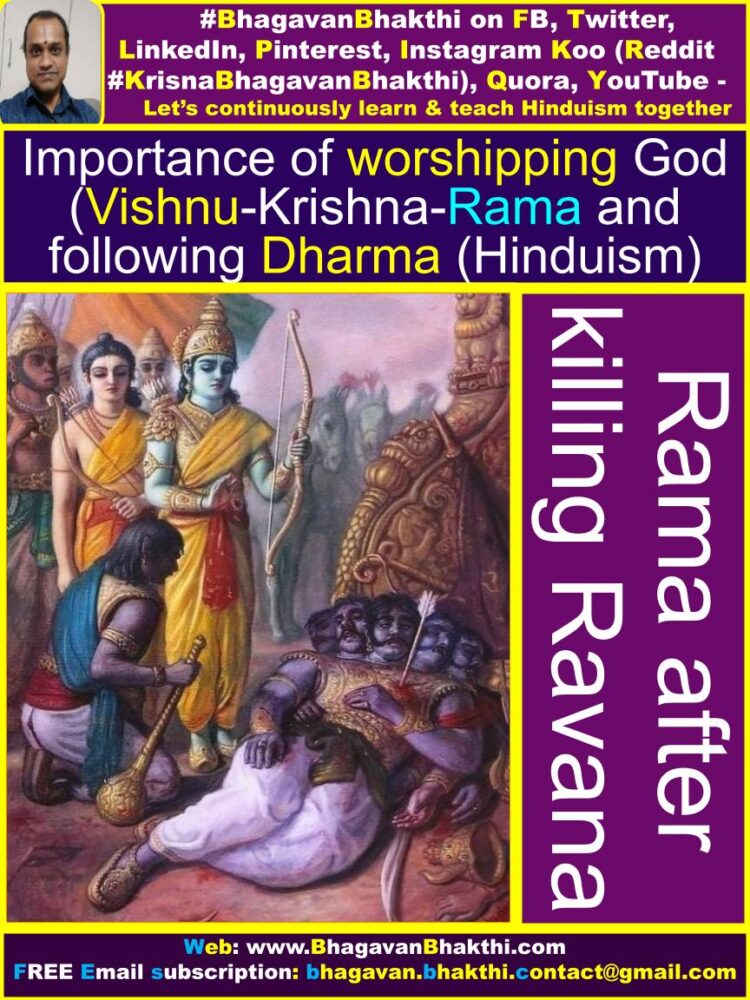
Vibhishana : Vibhishana was the brother of the demon King Ravana, but a great devotee of Lord Sri Rama (Vishnu) and at the same time followed the rules and regulations of Sanatana Dharma. He never deviated from his Dharma.
Vibhishana used to fast on Ekadashi day and was performing all rituals of Dharma as prescribed in Hindu scriptures. When Vibhishana advises his brother Ravana to release Sita Devi, Ravana angrily kicks Vibhishana in front of all the courtiers and humiliates Vibhishana in the Lanka assembly.
Thus Vibhishana surrenders to Lord Sri Rama and joins his army. Then, Lord Sri Rama made Vibhishana the King of Lanka. This is the glory of following Sanatana Dharma.
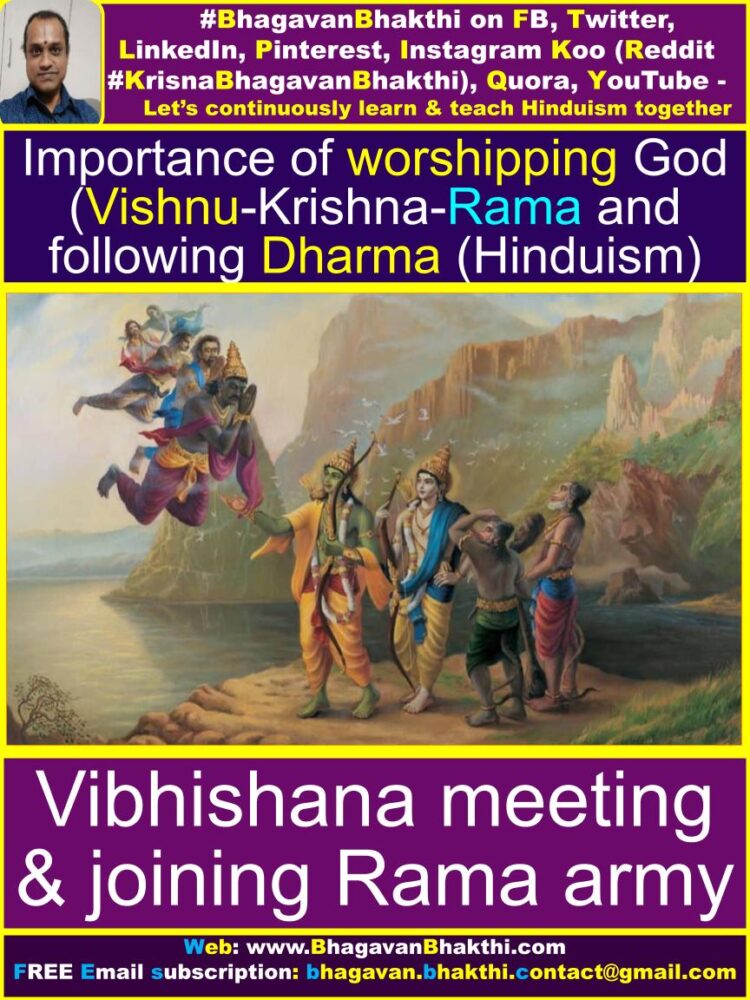
King Ambarisha : There was a king named Ambarisha who came from Suryavansh (Solar Dynasty) lineage. He was an ardent devotee of Lord Sri Vishnu.
Once on the day of Dwadashi (the day after Ekadashi), Sage Durvasa came to meet King Ambarisha and instructed King Ambarisha to perform ‘Dwadasha Parana’ along with the king. It is very important to perform Parana within the time limit on Dwadashi day. But, Rishi Durwas takes his own time.
In the meantime, King Ambarisha with the advice of Devarshi Narada performs pooja, drinks some water and completes the Parana. When Rishi Durvasa comes to know about this, Rishi Durvasa tries to curse King Ambarisha.
On the other hand, King Ambarish followed the right path of Sanatana Dharma (Hinduism) and thus completely surrendered to Lord Sri Vishnu and sought his help. Lord Sri Vishnu sends his Sudarshana Chakra (Disc) and almost kills Durvasa.
However, Sudarshana Chakra does not harm sage Durvasa, but warns Durvasa not to harm King Ambarish. This is the laurels of following Sanatana Dharma (Hinduism).
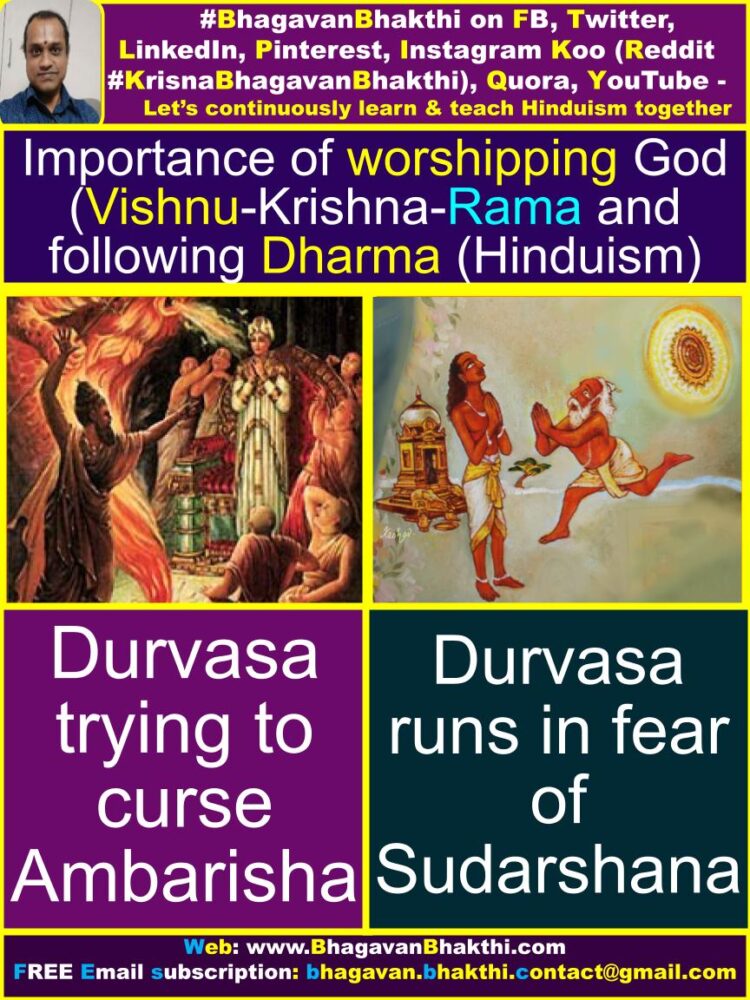
King Bali (Mahabali) : Although King Bali (Mahabali) was a great devotee of Lord Sri Vishnu and followed the path of Sanatana Dharma, he used to trouble Lord Indra and other Devatas (Demigods) who were staunch devotees of Lord Sri Vishnu.
When King Bali was performing his 100th Ashwamedha Yajna, Lord Sri Vishnu took the avatar of Lord Vamana and asked for 3 paces (feet) of land. King Mahabali accepted this as he was a great devotee of Lord Vishnu.
Lord Vaman raises his body and becomes Lord Trivikrama and takes his first step on the higher planets as his second step on earth. When Lord Trivikrama asked King Bali where to place his third foot, King Bali asked Trivikrama to place it on his head.
With this Trivikrama pushes King Mahabali to Sutala Loka. But the greatness of Lord Sri Vishnu is that Lord Vishnu will make King Bali the King of Sutala Loka and in the next Manvantara will make Bali the King of Swarga Loka i.e. Sri Vishnu will make Bali the next Lord Sri Indra.
Even though if someone is a great devotee of Lord Sri Vishnu and harms other devotees of Lord Sri Vishnu, He (Lord Sri Vishnu) will not tolerate it. Lord Sri Vishnu will surely punish that person and will surely help his other devotees. This is the glory of following Sanatan Dharma.
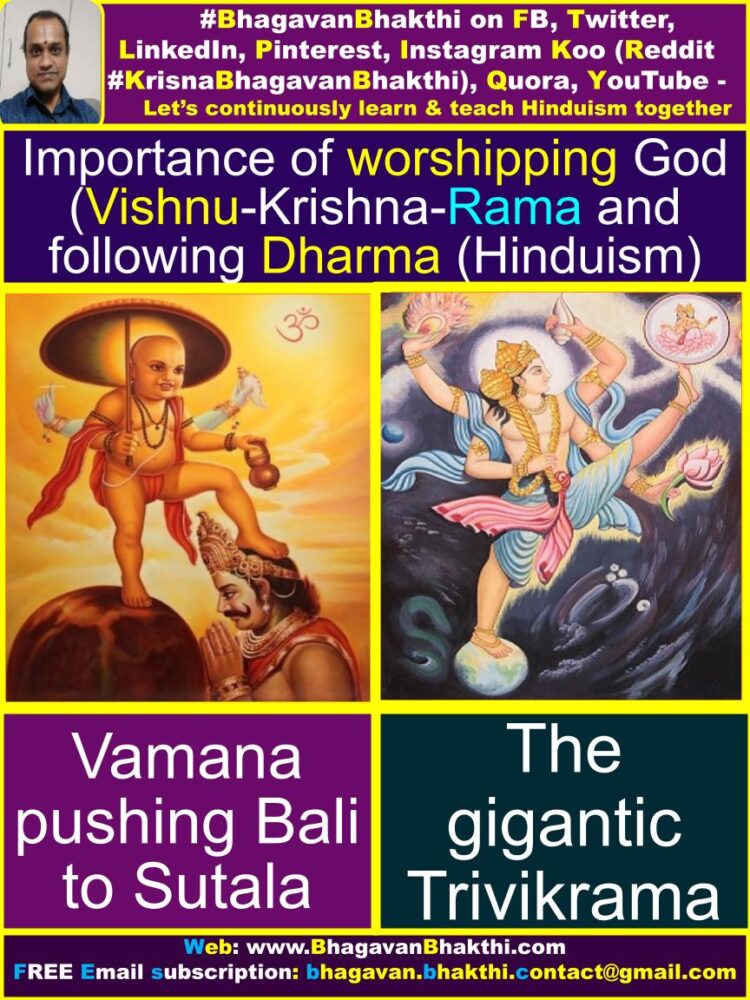
Paundraka Vasudeva : Paundraka Vasudeva was the king of Paundra kingdom and was a shameless person and was an enemy of Lord Sri Krishna. He adorned and impersonated Lord Sri Krishna or Lord Sri Vasudeva and changed his name from Paundraka to Paundraka Vasudeva.
Paundraka Vasudeva forcefully ordered his people to worship him and not Lord Krishna. Our Sanatana Dharma says very clearly that no one should imitate Lord Sri Krishna (Vishnu).
Paundraka Vasudeva was troubling the devotees of Lord Sri Krishna and thus, finally Lord Sri Krishna waged war against Paundraka Vasudeva and killed him with his Sudarshana Chakra (disc) just like a huge elephant killing a small ant with highest ease.
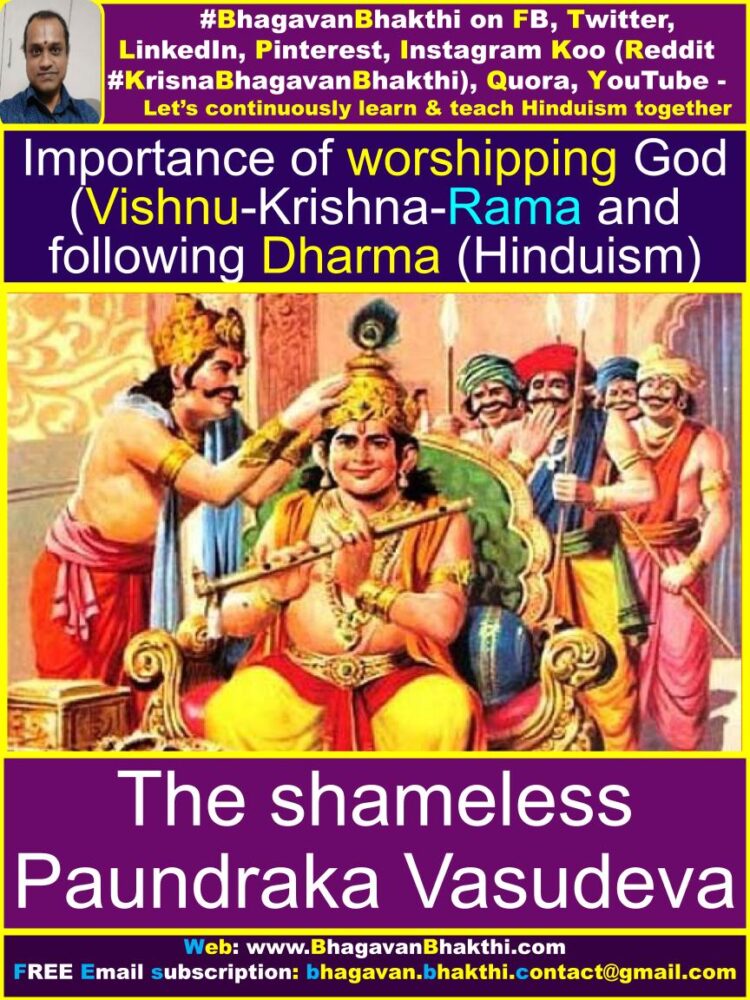
Sandipani Rishi : Rishi Sandipani was a great devotee of Lord Krishna. Lord Sri Krishna was a student of this great Guru Sandipani Rishi. After completing his studies, Lord Sri Krishna asked Rishi Sandipani for ‘Gurudakshina’.
For this Rishi Sandipani says that he wanted to see his dead son who had fell in the ocean near Prabhasa. Two brothers Lord Sri Krishna and Balarama traveled to Prabhasa (present day Somnath) and found the son kidnapped by a demon named Shankhasura.
Lord Sri Krishna rescued his son and he returned him to his Guru. Even though if you are Lord Sri Krishna’s Guru, if you are His devotee, He will definitely help you if you follow Sanatana Dharma (Hinduism).
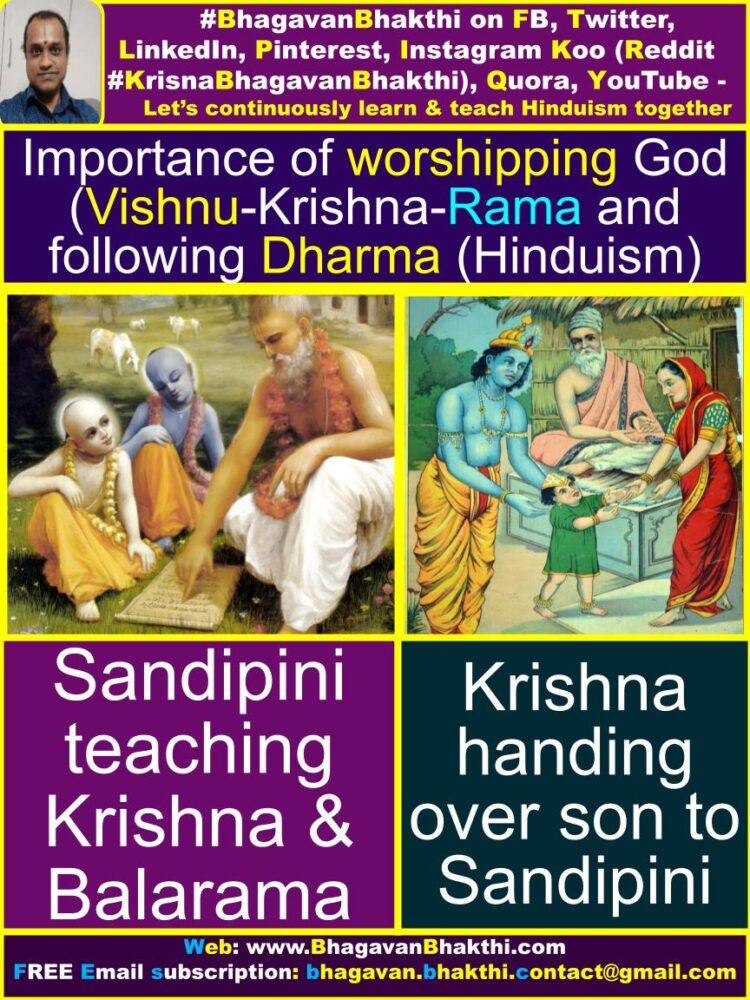
Jarasandha : Even though Jarasandha was an ardent devotee of Lord Shiva and if you are an antagonist of Lord Sri Krishna, he (Krishna) will not spare you and will surely punish you. Jarasandha had captured 21,000 kings who were devotees of Lord Sri Krishna.
Lord Sri Krishna accompanied Arjuna and Bhima to Jarasandha’s capital Magadha (present-day Bihar). Since Jarasandha was an enemy and against religion (Vaishnavism), he (Krishna) did not want to kill Jarasandha and on the other hand, Lord Krishna wished a great Vaishnava should kill the demonic natured Jarasandha.
Thus, Lord Sri Krishna instructs a great Vaishnava named Bhima (one of the Pandavas) to kill Jarasandha. Bhima easily tears Jarasandha’s body as instructed by Lord Sri Krishna.
So we have to remember that even if you are an ardent follower of Lord Shiva and you are not a Vaishnava (against Dharma) you will not be saved. It shows the Supremacy of Lord Krishna.
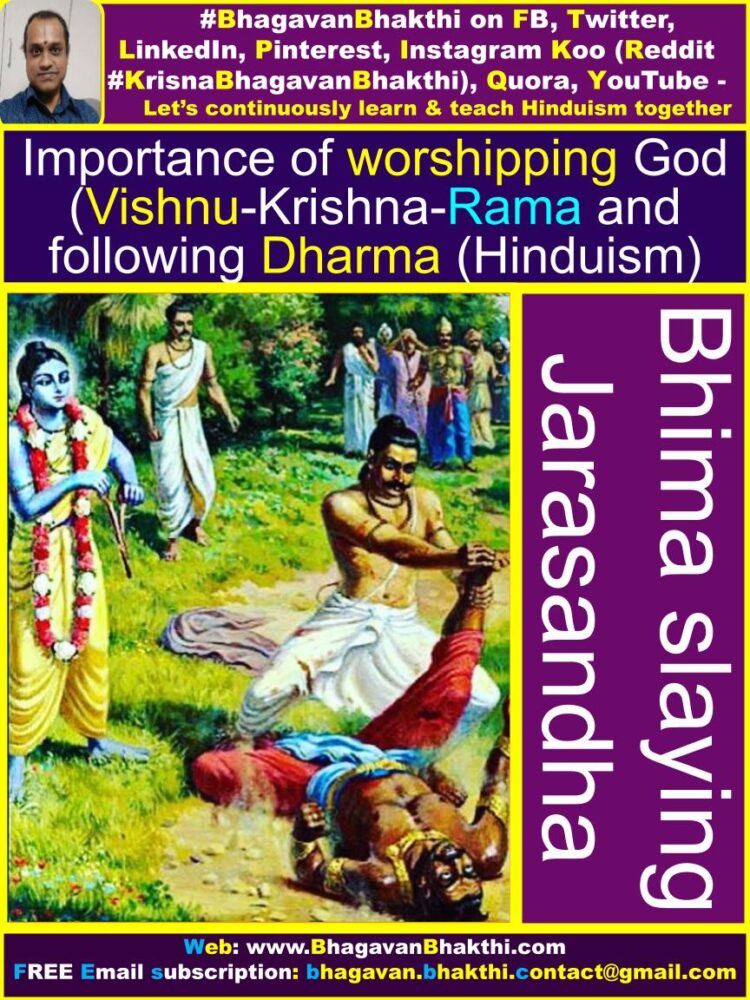
Putana : Putana was a demon named Tataka (Tadka) in her previous life. Tataka was killed by Lord Sri Rama during Treta Yuga. During the Mahabharata (Dvapara Yuga) she was reborn as Putana. Baby Sri Krishna was only 7 days old when Putan tried to kill Lord Sri Krishna.
We should always remember that Lord Krishna is an incarnation of Lord Sri Vishnu. It doesn’t matter to him if he has just taken an avatar or if he is a fit and strong man. Lord Sri Krishna is Lord Sri Krishna, whatever his age is.
The ogress Putana picks up baby Krishna and try to kill Krishna with her poisoned breast milk. But our Lord Sri Krishna knows everything. He drinks the poisonous milk and it doesn’t harms him even in the tiniest way.
On the other hand, Baby Lord Sri Krishna sucks the life of Ogress Putana, kills her instantly and sends her to the lower planets (Naraka / Hell). Even though if you are female and don’t follow Dharma, you won’t be spared.
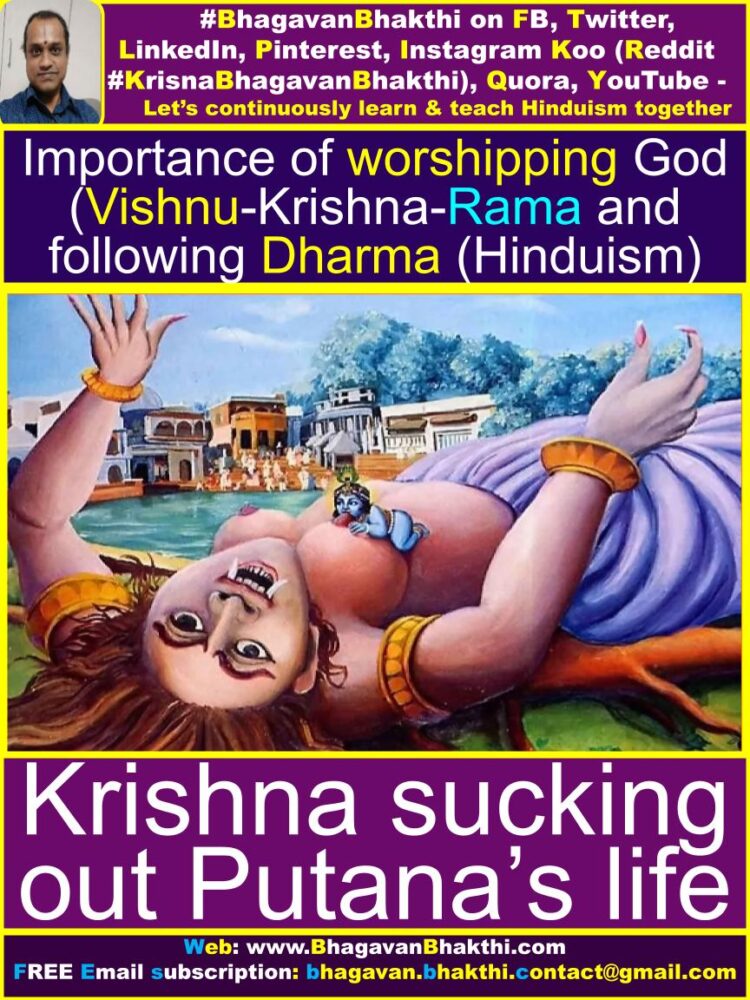
Vidura : He was a great devotee of Lord Sri Krishna (Vishnu) and was an avatar of Lord Dharma (Yama). When Lord Krishna comes as an ambassador from the Pandavas side and tries to negotiate with Duryodhana, he (Duryodhana) orders his soldiers to arrest Lord Lord Krishna. But who can arrest Lord Krishna, the Lord of the infinite universe.
After this, all the people present in the meeting invite Lord Sri Krishna to stay in their houses. However, Lord Sri Krishna refuses to stay in their houses, but wants to stay in Vidura’s house. This happens because Vidura raised his voice against Draupadi’s disrobing. Whereas others were silent.
This shows that whenever and wherever wrongdoing (Adharma) is happening, you must raise your voice. Otherwise, even though you are a devotee of Lord Sri Krishna, Lord Sri Krishna will not like you. The same happened to great men like Bhishma, Drona, Ashwatthama, Karna, Kripacharya, etc.
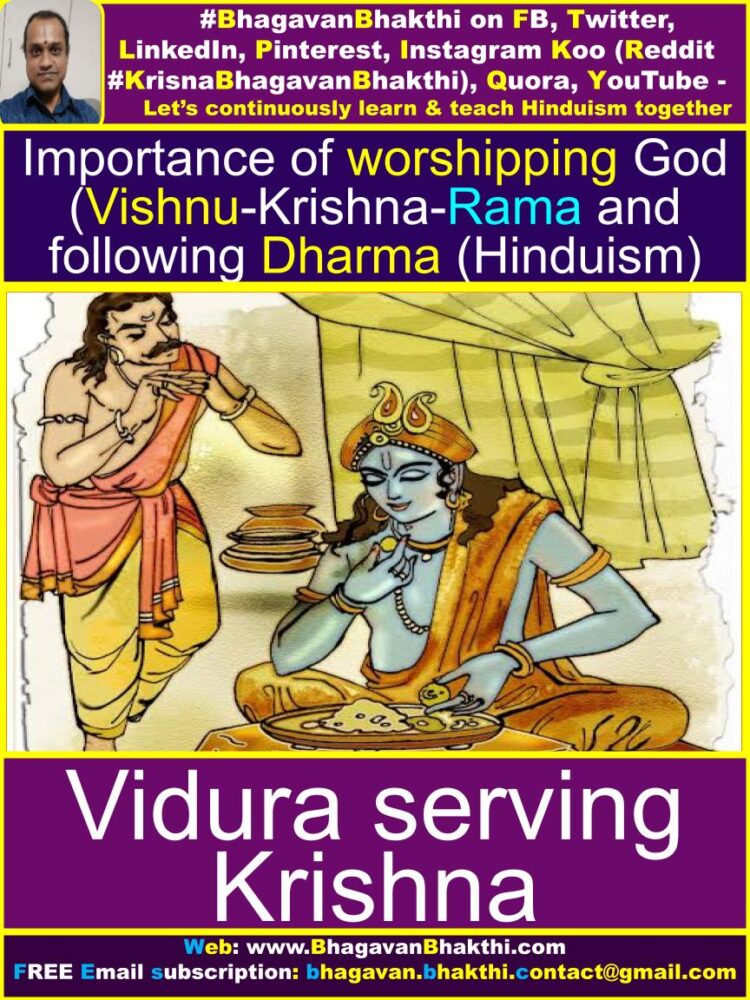
Mala Maas : Mala maas (masam) is the Devata (Demigod) who presides over the adhik masa or masam (leap month in Hindu calendar. All other Devatas (Demigods) were not at all paying any respect to him because he was called Mala Maas (unnecessary extra month).
Thus he goes to Lord Sri Purushottama (Vishnu) in the place called Goloka and asks for help. After listening to all the problems of Mala Maas (it is a name), Lord Sri Purushottama (Vishnu) told to him, “henceforth all will call you ‘Purushottama Maas’ and you will be the best among all other maas (months).”
Lord Sri Purushottama continued – “All other maas (months) will give you high respect.” This is the excellence of people who follow Sanatana Dharma (Hinduism).
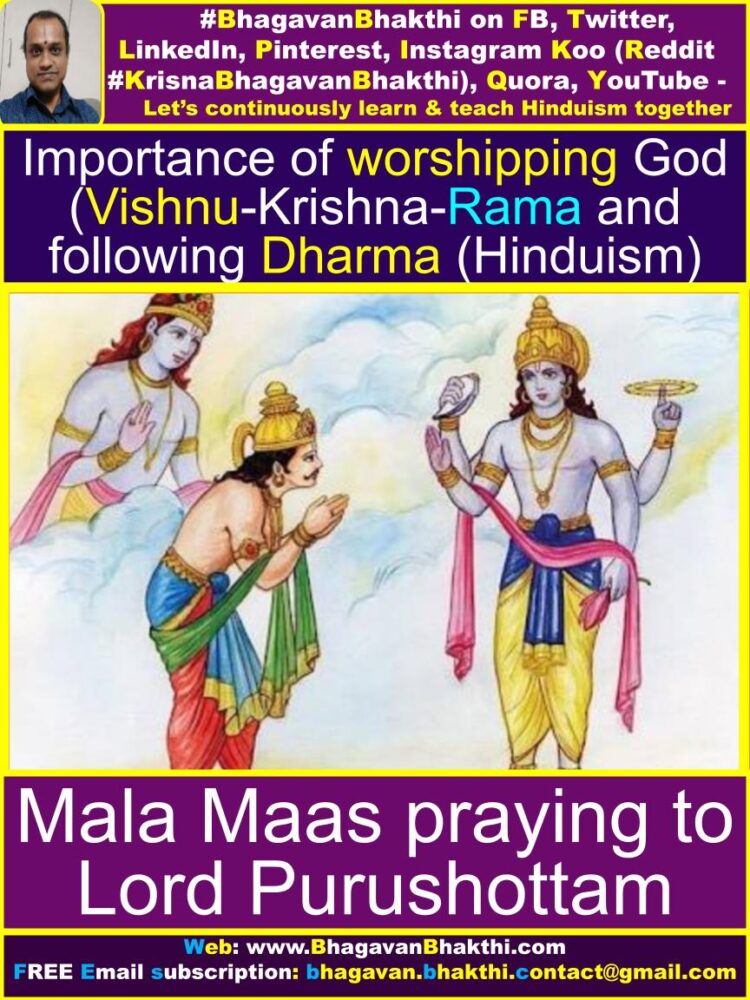
Narada : In his earlier life Devarshi Narada was born in a Shudra family. At that time when he was about 5 years old, he served few divine Rishis (Sages). Narada in his previous life worked with his mother in a Brahmin family.
A group of Sages (Rishis) came there and Narada served all these great sages. Seeing the divinity in young boy, all the sages blessed Narada for a better life in his next life. Our Lord Sri Vishnu loves his devotees.
Thus Lord Sri Vishnu made that boy the son of Lord Sri Brahma in the next birth and made him the greatest of all sages. If one follows Dharma, one is sure to rise even if one is born in a Shudra family.
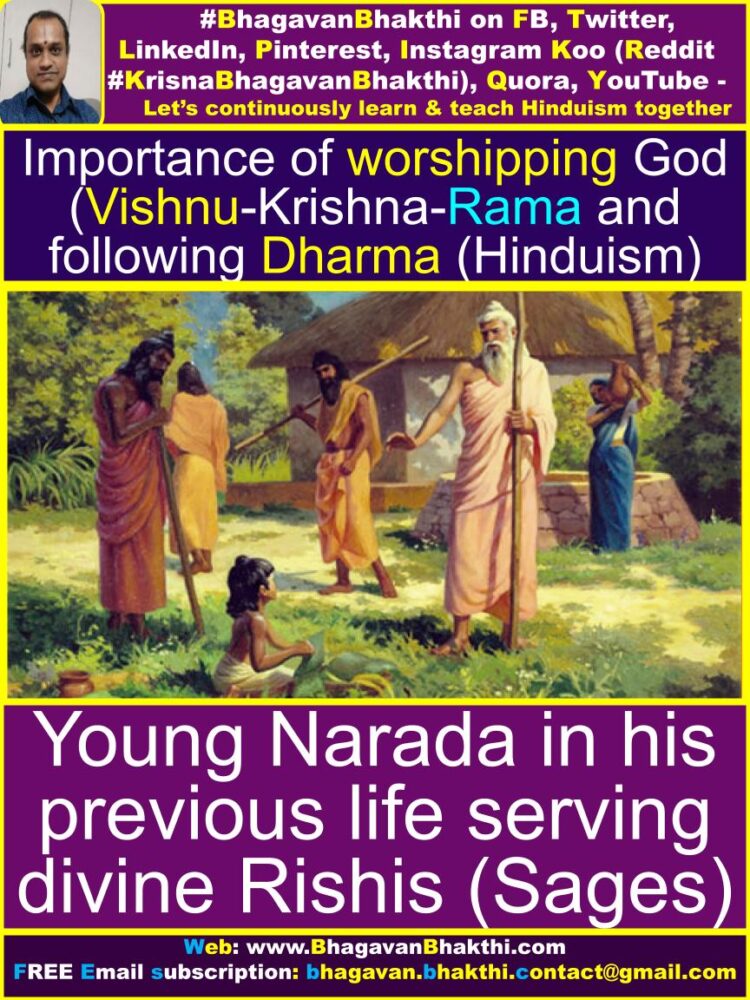
Continue reading about Hindu Samskaras (Sanskars) – Hindu Samskaras (Sanskar) information, significance, importance.
More information will be added to this on regular basis, please visit after some time to know more information.
To watch videos on #Hinduism #Sanskrit language, SUBSCRIBE to my YouTube channel from this below link:
#BhagavanBhakthi YouTube channel
Dear friends, if you need any clarifications about this post, kindly let me know, I will definitely try to answer all of them.
Also your one LIKE, one COMMENT, One Share, one SUBSCRIPTION is highly important.
This will help to know the quality of this content and also it will be helpful to know if any improvements is required for the content.
If you feel this content is useful to you and has helped you to improve your knowledge, kindly share this with your well-wishers.
Because “SHARING MEANS CARING”.
To receive FREE EMAIL SUBSCRIPTION about #BhagavanBhakthi, you can send an email to [email protected] from your email ID.
NAMASTE!
Sri Gurubhyo Namaha
Sri Krishnaaya Namaha
Sri Krishnaarpanamastu
Subscribe / Follow us Share in Social Media